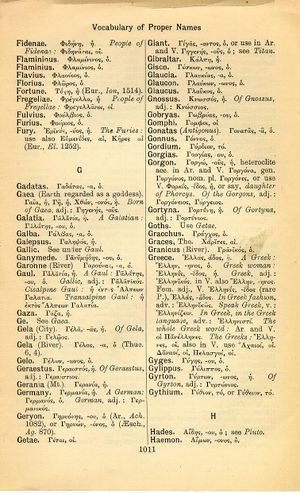Glaucus
οὐκ ἐπιλογιζόμενος ὅτι ἅμα μὲν ὀδύρῃ τὴν ἀναισθησίαν, ἅμα δὲ ἀλγεῖς ἐπὶ σήψεσι καὶ στερήσει τῶν ἡδέων, ὥσπερ εἰς ἕτερον ζῆν ἀποθανούμενος, ἀλλ᾿ οὐκ εἰς παντελῆ μεταβαλῶν ἀναισθησίαν καὶ τὴν αὐτὴν τῇ πρὸ τῆς γενέσεως → you do not consider that you are at one and the same time lamenting your want of sensation, and pained at the idea of your rotting away, and of being deprived of what is pleasant, as if you are to die and live in another state, and not to pass into insensibility complete, and the same as that before you were born
English > Greek (Woodhouse)
Γλαῦκος, ὁ.
Latin > English (Lewis & Short)
Glaucus: i, m., = Γλαῦκος,
I a Greek proper name.
I A son of Sisyphus, devoured by his own horses, Verg. G. 3, 267.—
II The commander of the Lycians in the Trojan war, a friend of Diomede, Hor. S. 1, 7, 17.—
III A fisherman of Anthedon, in Eubœa, who was changed into a sea-god, Ov. M. 13, 906 sq.; 14, 9; 38; 68; 7, 233: Glauci chorus, the Nereids, Verg. A. 5, 823; Stat. Th. 7, 335.
Latin > French (Gaffiot 2016)
(3) Glaucus,¹³ ī, m., fils de Sisyphe, père de Bellérophon, déchiré par ses cavales : Virg. G. 3, 267 || pêcheur de Béotie, changé en dieu marin : Ov. M. 13, 906 ; cf. Virg. En. 5, 823 || guerrier lycien, au siège de Troie : Hor. S. 1, 7, 17.

